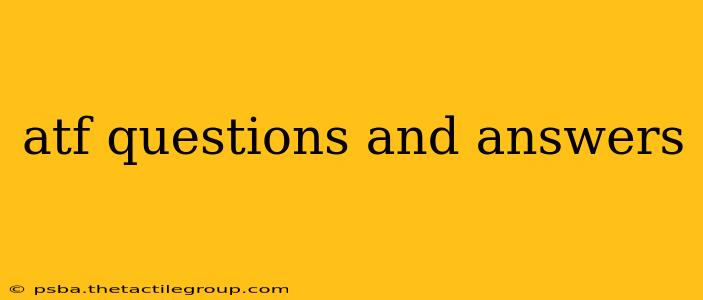The Bureau of Alcohol, Tobacco, Firearms and Explosives (ATF) plays a crucial role in enforcing federal firearms laws and regulations in the United States. Understanding its processes and regulations is vital for both firearm owners and industry professionals. This comprehensive guide addresses frequently asked questions about the ATF, covering key areas like firearms licensing, regulations, and enforcement.
Firearms Licensing and Registration
Q: What is a Federal Firearms License (FFL)?
A: An FFL is a license issued by the ATF that allows individuals and businesses to engage in the business of importing, manufacturing, or dealing in firearms. This includes selling, repairing, and transferring firearms. The specific requirements for obtaining an FFL vary depending on the type of business.
Q: Do I need an FFL to sell firearms privately?
A: Generally, no. However, there are exceptions. For example, if you're regularly selling firearms, you might be considered a dealer and require an FFL. State laws also vary, so it's crucial to check your state's regulations. Selling firearms across state lines typically requires more stringent compliance with federal laws and may necessitate an FFL.
Q: Are firearms registered with the ATF?
A: The ATF does not maintain a national registry of firearms owned by private citizens. However, licensed dealers must maintain records of firearms they sell. Specific record-keeping requirements are outlined in ATF regulations.
Q: What are the requirements for purchasing a firearm?
A: Federal law requires a background check through the National Instant Criminal Background Check System (NICS) before most firearm purchases. Additional state and local laws may apply. Individuals prohibited from possessing firearms, such as convicted felons or those with certain mental health conditions, are ineligible to purchase firearms.
ATF Regulations and Enforcement
Q: What are the rules surrounding NFA items (National Firearms Act)?
A: The NFA regulates certain firearms, including machine guns, silencers, short-barreled rifles and shotguns, and destructive devices. These items require a separate tax stamp and registration with the ATF before they can be legally owned. The process involves submitting an application, undergoing a background check, and paying a significant tax.
Q: What are the penalties for violating ATF regulations?
A: Penalties for violating ATF regulations can be severe, ranging from significant fines to imprisonment. The severity of the penalties depends on the nature and severity of the violation.
Q: How does the ATF trace firearms?
A: The ATF traces firearms through the records maintained by licensed dealers. When a firearm is recovered at a crime scene, investigators can trace it back through its chain of custody to determine its origin and previous owners.
Q: What is the ATF's role in combating illegal firearms trafficking?
A: The ATF plays a significant role in investigating and disrupting illegal firearms trafficking networks. This involves collaborating with other law enforcement agencies at local, state, and federal levels to track and prosecute those involved in the illegal sale and distribution of firearms.
Staying Informed and Compliant
This Q&A offers a general overview; the intricacies of ATF regulations are extensive. Always consult the official ATF website and relevant legal professionals for the most up-to-date and accurate information. Staying informed about changes in federal and state firearm laws is essential for responsible firearm ownership and compliance. Ignoring these regulations can lead to serious legal consequences.
Disclaimer: This information is for educational purposes only and should not be considered legal advice. Always consult with legal professionals for guidance on specific situations related to firearms laws and regulations.

